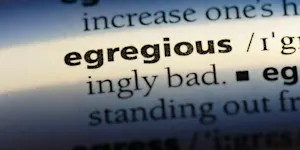What Makes This Word Tick
"Platitude" is a catchy word for bland statements that pretend to be wise or meaningful. It's like the deadpan sidekick in a comedy—always there but rarely stealing the show. The word has an understated charm, serving as a reminder that not every statement carries the weight it purports to.
If Platitude Were a Person…
Picture your favorite well-meaning but forgettable neighbor who always says just the right thing—yet somehow, nothing memorable. Platitude would be that person, offering safe but shallow observations wrapped in a polite smile. They mean well but rarely surprise.
How This Word Has Changed Over Time
Since its debut in the early 19th century, "platitude" hasn't veered far from its original use. Initially meant to describe a flat or plain statement, its essence of lackluster communication has remained remarkably consistent. Over time, it's become more of a critique on the unoriginality of such remarks.
Old Sayings and Proverbs That Use Platitude
"Platitudes are the wallpaper of conversation" is a playful way to limn the role these statements play in daily dialogue. They cover walls of conversation with something familiar yet ultimately forgettable, providing a backdrop without adding depth.
Surprising Facts About Platitude
Did you know "platitude" was first used in 1762 during the Enlightenment? There's irony in a word marking unoriginal thoughts arising in a time brimming with fresh ideas. Plus, it’s a favorite word amongst critics of motivational speeches and pop management.
Out and About With This Word
In social settings, platitudes often emerge in polite conversations at family gatherings or diplomatic speeches. These ever-so-slightly nod to consensus without making waves—much like the agreeable stranger at a party nodding at every point made.
Pop Culture Moments Where Platitude Was Used
Hollywood loves satirizing platitudes. Just look at “The Office,” where Michael Scott’s inept, yet earnest phrases highlight their ever-so-obvious truths wrapped in eye-roll-worthy delivery. It's humor born from the obviousness that makes viewers chuckle (or cringe).
The Word in Literature
In literature, "platitude" often finds itself critiqued or satirized, especially in works scrutinizing societal norms. Think of the novels poking fun at societal pretenses, where characters spout seemingly deep but ultimately empty statements.
Moments in History with Platitude
Consider any political rally where the speaker inspires with bold yet hollow promises. While such moments rarely go down in the annals of history themselves, they set the stage for more memorable actions—or inactions—that follow.
This Word Around the World
While “platitude” carries a similar connotation in many languages, cultural equivalents often shift the nuance. In France, the origin of the word, a “platitude” still strikes as a flat and uninspired remark. Different cultures offer their variations, but the essence of something trite holds true universally.
Where Does It Come From?
Rooted in the French word "plat," meaning flat, plus "-itude,” it's a literal term for flatness. This etymology strikes at the heart of its modern use to highlight lackluster declarations masquerading as insightful commentary.
How People Misuse This Word
Folks often use "platitude" when a remark feels empty or meaningless, but misuse can arise when mistaking any simple statement for one lacking depth. Not every brief comment is a platitude, though it might seem that way if you're in a cynical mood.
Words It’s Often Confused With
Cliché: While also overused, clichés are phrases with broader recognition.
Banal: More focused on uninteresting ideas or common qualities.
Truism: An obviously true statement, often lacking depth but not necessarily overused.
Additional Synonyms and Antonyms
Synonyms for "platitude" include "cliché," "truism," and "banality." As for antonyms, consider "originality," "insight," and "novelty." These words reflect a freshness and creativity that "platitude" lacks.
Want to Try It Out in a Sentence?
Next time you’re at a gathering and hear a predictable sentiment, perhaps it’s time to nod knowingly and mutter, “Ah, another platitude!” It could spark a more interesting conversation—or at least a chuckle.
















